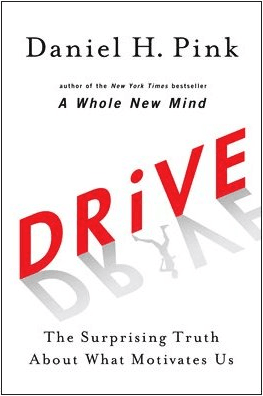There is a word in Japanese – ikigai (生き甲斐 – pronounced “ee-ki-guy”). There is no one word in English that is its equivalent. In fact, to express the concept in English, we have borrowed a phrase from French – raison d’être.
Roughly, the words ikigai and raison d’être mean “your reason for being” or “that which is important to you” or “why you get up in the morning”. They answer the question: “What drives you?”

It is the concept of drive that lies at the heart of a new book by Dan Pink entitled Drive: The Surprising Truth About What Motivates Us.
In Drive, Pink looks at the psychology of what motivates us. We have been conditioned to think that the best way to motivate someone is through a “carrot and stick” approach; for example, more money for better work or penalties for substandard work. Pink argues that these kinds of external motivators do more harm than good. And he draws on an impressive amount of scientific research to support his premise.
Last year, I wrote a seven-part series on how to make your speeches and presentations stick in the minds of your audiences. It was based on the book Made to Stick by Chip and Dan Heath. The third article in that series – Making it stick: Be unexpected – featured a video of a talk that Pink gave on motivation at a TED conference in July 2009. It is worth watching (or re-watching).
But if extrinsic motivators do not work, what does? Intrinsic motivators, of course. And Pink offers us three:
Autonomy
The desire to direct our own lives. “People need autonomy over task (what they do), time (when they do it), team (who they do it with), and technique (how they do it). Companies that offer autonomy, sometimes in radical doses, are outperforming their competitors.”
Mastery
The urge to get better and better at something that matters. “Mastery begins with ‘flow’ – optimal experiences when the challenges we face are exquisitely matched to our abilities. … [It ] is is a mindset. It requires the capacity to see your abilities not as finite, but as infinitely improvable. Mastery is pain. It demands effort, grit and deliberate practice. And mastery is an asymptote: It’s impossible to fully realize, which makes it simultaneously frustrating and alluring.”
Purpose
The yearning to do what we do in the service of something larger than ourselves. “Humans, by their nature, seek purpose – a cause greater and more enduring than themselves. … [P]uprose-maximization is taking its place alongside profit-maximization as an aspiration and a guiding principle. … This move … has the potential to rejuvenate our businesses and remake our world.”
How does this relate to public speakers?
These insights might seem like common sense; however, as Mark Twain once said, common sense is not so common. Pink’s recommendations are perceptive. They are also relevant for public speakers.
Autonomy
We get to craft our speeches. Although we are often required to speak on a particular subject, we usually have a fair amount of latitude in terms of the content of our presentations and how we present them. And although we might have technical and other support, when we are on stage, it is our show.
Mastery
We all want to improve our public speaking skills. But there has never been – and never will be – a public speaker who is perfect. There will always be room for improvement, for refinement, for polishing. Therein lies the challenge and the appeal.
Purpose
As public speakers, we have the ability to influence our audiences. We can inform, entertain, persuade or motivate them. Words are powerful things; we have the responsibility to use them properly and for a constructive purpose.
In Drive, Pink does not only discuss the science of motivation; he has developed a 50-page toolkit full of exercises, suggestions, websites, book suggestions and more, all of which can help you bring more drive to the different professional and personal aspects of your life.
















4 Replies to “What drives you?”
John —
Thanks for the great review. I really appreciate the kind words and keen thoughts.
Cheers,
Dan Pink